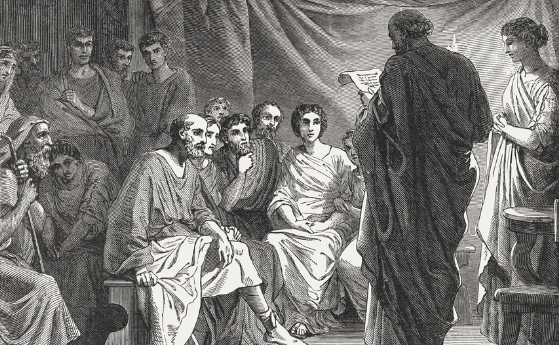The views expressed in our content reflect individual perspectives and do not represent the authoritative views of the Baha'i Faith.
According to the Synoptic Gospels of Matthew and Luke, Jesus of Nazareth was born in the genealogical line descending from David, and thence from Abraham.
While the Gospels of Matthew and Luke narrate the familiar story of Christ’s birth, all four gospels give great importance to the appearance of John the Baptist as the forerunner or herald of the advent of the Messiah (Hebrew for “the anointed one”), as prophesied explicitly in Isaiah.
John immediately recognized Jesus as the promised Christ and proceeded at Jesus’ insistence to baptize or anoint him. From this point on, Jesus is addressed and alluded to as Christ – both a title and a symbol of his having assumed his station in fulfillment of Judaic prophecies and traditions regarding one who would appear from the Davidic line to bring about a “Messianic Age.”
RELATED: Jesus Foretold the “Glory of God” – Baha’u’llah
To all appearances, Jesus was a simple carpenter, an artisan living an uneventful and unspectacular life, until his encounter at the Jordan River with John the Baptist, an itinerant preacher who taught that one greater than himself would soon appear. This Messiah, John foretold, would redeem occupied Jerusalem by instigating a spiritual reformation.
John the Baptist exhorted everyone — his followers and even political figures — to prepare for this advent by repenting of their sins. As a symbolic ritual of their preparation for and dedication to this apocalyptic prophecy, John baptized his followers by immersing them in the waters of the Jordan River.
The three synoptic gospels (Matthew, Mark, and Luke) then describe the baptism of Christ by John, although the gospel of John omits this event. The three accounts differ as to the particulars. The most memorable description of the event in terms of a transformative epiphany for Jesus occurs in Mark 1:9:
And it came to pass in those days that Jesus came from Nazareth of Galilee and was baptized of John in Jordan. And straightway coming up out of the water, He saw the heavens opened, and the Spirit like a dove descending upon Him. And there came a voice from heaven, saying, ‘Thou art my beloved Son, in whom I am well pleased’.
In the gospels, this event marks the beginning of the narration of Christ’s ministry. From this point forward, Jesus of Nazareth assumes the title “Christ,” a word derived from the Greek Khristos, meaning “the Anointed One,” an obvious allusion to both his baptism and to his fulfillment of the Hebrew expectation of the Messiah, a term that also means “anointed” or “sanctified.”
Thus, later in his ministry when Christ questions his own disciples about who people say he is – and, in particular, about who the disciples say he is – Christ cautions them in Mathew 16 not to withhold divulging to anyone what Peter has just discerned, that Jesus is “the Christ,” the promised Messiah:
When Jesus came into the coasts of Caesarea Philippi, he asked his disciples, saying, “Who do men say that I the Son of man am?”
And they said, “Some say that thou art John the Baptist: some, Elias; and others, Jeremias, or one of the prophets.”
He saith unto them, “But who say ye that I am?”
And Simon Peter answered and said, “Thou art the Christ, the Son of the living God.”
And Jesus answered and said unto him, “Blessed art thou, Simon Barjona: for flesh and blood hath not revealed it unto thee, but my Father which is in heaven. And I say also unto thee that thou art Peter, and upon this rock I will build my church; and the gates of hell shall not prevail against it. And I will give unto thee the keys of the kingdom of heaven: and whatsoever thou shalt bind on earth shall be bound in heaven: and whatsoever thou shalt loose on earth shall be loosed in heaven.”
Then charged He his disciples that they should tell no man that He was Jesus the Christ.
RELATED: Did Baha’u’llah Fulfill the Prophecies of Jesus?
This Biblical passage clearly shows that Jesus, formerly a humble carpenter, was aware of His station, was aware that he was the Promised Messiah, the Christ, the recipient of divine guidance directly from God, Whom Christ in his teachings would refer to as “the Father.”
Briefly this Man (Christ), Who appeared lowly in the eyes of all, arose nonetheless with such power as to abrogate a fifteen-hundred-year-old Dispensation, notwithstanding that the least deviation from its laws would expose the offender to grave danger and bring about his death and annihilation. …
This young Man, Christ, through an extraordinary power abrogated the ancient Mosaic Law and undertook to reform the morals of the people. He once again laid the foundation of eternal honour for the Israelites – nay, He undertook to rehabilitate the fortunes of the entire human race – and spread abroad teachings that were not reserved for Israel alone but formed the basis for the universal happiness of human society. …
Is this at all possible in accordance with the rules of human reason? No, by God! Then it is clear and evident that this glorious Being was a true Educator of the world of humanity and that He was aided and assisted by a divine power.
Christianity would go on to unify the Roman Empire which would spread the teachings of Christ throughout the lands it occupied, thereby fulfilling the prophecies of the Old Testament about the impact the Messiah would bring about.
















Comments
Sign in or create an account
Continue with Googleor